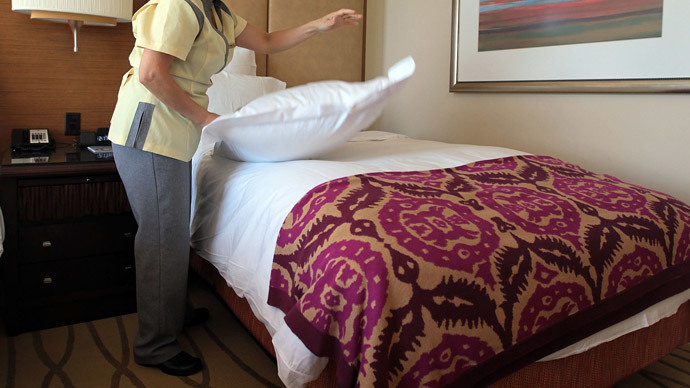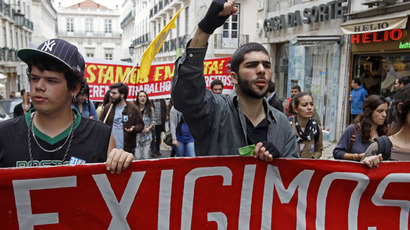State Dept. ‘cultural exchange’ workers often used as cheap labor, exploited – report

Hundreds of youths from around the world who come to the US through a cultural exchange program ultimately facilitated by the State Department end up being used as cheap, exploited labor for employers, according to a new report.
The Southern Poverty Law Center (SPLC) interviewed hundreds of workers, mostly students, who were lured to the US with promises of educational activities and cultural enrichment through the J-1 Visa Exchange Visitor Program only to end up working low-paying jobs with long hours. Some, the report states, are even at risk of human trafficking.
SPLC said the now-poorly-regulated program was originally created to improve US diplomatic relations, yet workers in the J-1 Summer Work Travel Program and the J-1Trainee and Intern Program are often used by American employers to cut labor costs. The special guest worker visas the workers hold do not require employers to supply payroll taxes. The two J-1 visa categories make up over 130,000 foreign workers that come to the US each year.
J-1 prospects first meet with State Department-designated job placement agencies, known as sponsors, that charge the students hundreds or thousands of dollars to be placed with a US employer. The sponsors’ overseas partners also charge at times high fees for services. These fees are all unregulated, and students often borrow to pay them, the report says.
Foreign students interested in entering the program for a chance to live in the US, learn about the country’s culture or improve their English are promised good wages at attractive job sites with adequate housing.
Once in the US, the J-1 workers often find themselves in low-wage positions that will not help them pay back their fee debt. Though they also have little choice but to continue working under conditions that are unsavory at best, and criminally abusive at worst.
The State Department claims it has no legal authority to hold employers accountable for these actions. In addition, SPLC found the agency does next to nothing to help J-1 workers with employment issues.
“Employers, sponsors, and overseas recruiting agencies have hijacked the cultural exchange program, turning it into a low-wage guest worker program that benefits their bottom lines at the expense of these workers and the United States’ reputation,” said Meredith Stewart, report author and SPLC staff attorney. “Each year that the State Department and Congress fail to reform this program is another year thousands of young people return to their home countries with stories about being exploited by U.S. employers with an insatiable appetite for cheap, vulnerable labor.”
To further her career in hospitality management, student Lhan Kassemwattan came from Thailand in 2011 on a J-1 visa to work at a hotel in Orlando, Florida for a year. She paid recruiters and sponsors US$8,000 for the job, borrowing from her mother with the expectation of being able to pay it back, as the recruiter promised a salary of $1,000 per month.
Yet upon arriving in the US, the hotel employer told her and other workers their jobs were not yet available, requiring them to borrow more money for shelter and food. After a month, Lhan was placed in a job as a housekeeper, which was not the job she was promised. She spent her entire term cleaning rooms and never made the promised $1,000 per month.
“What the sponsor and recruiter told me about the internship turned out to be a lie,” she said. “If I had known I was only going to be cleaning hotel rooms, I would not have paid so much money for the job.”
Another J-1 worker and her sister, from the Dominican Republic, went to work for a hotel in Tennessee as part of the program. When they arrived, they did not receive room and board at a “fancy hotel,” but were ordered to sleep in the resort’s stables with horses, which they had to clean in addition to making up rooms.
“I felt like we had no choice,” she told SPLC. “We had paid so much money to come here and have a decent job and cultural exchange experience. What we got was not what we signed up for.”
The report offered recommendations for restoring the program and providing protections for J-1 workers as well as US workers hurt by the cheap labor the program supplies employers.














